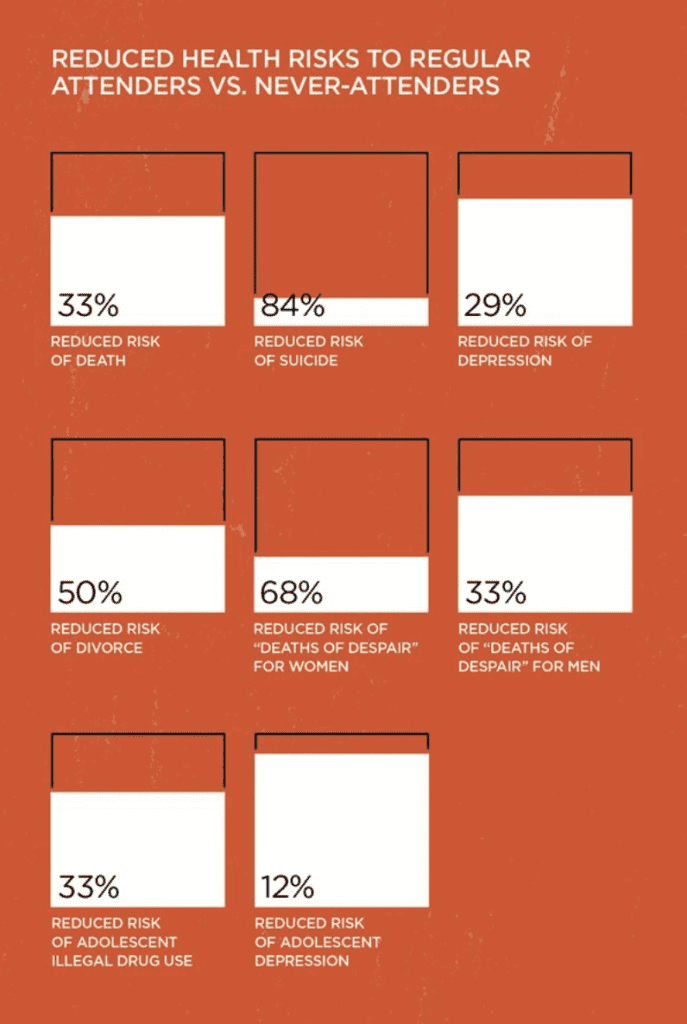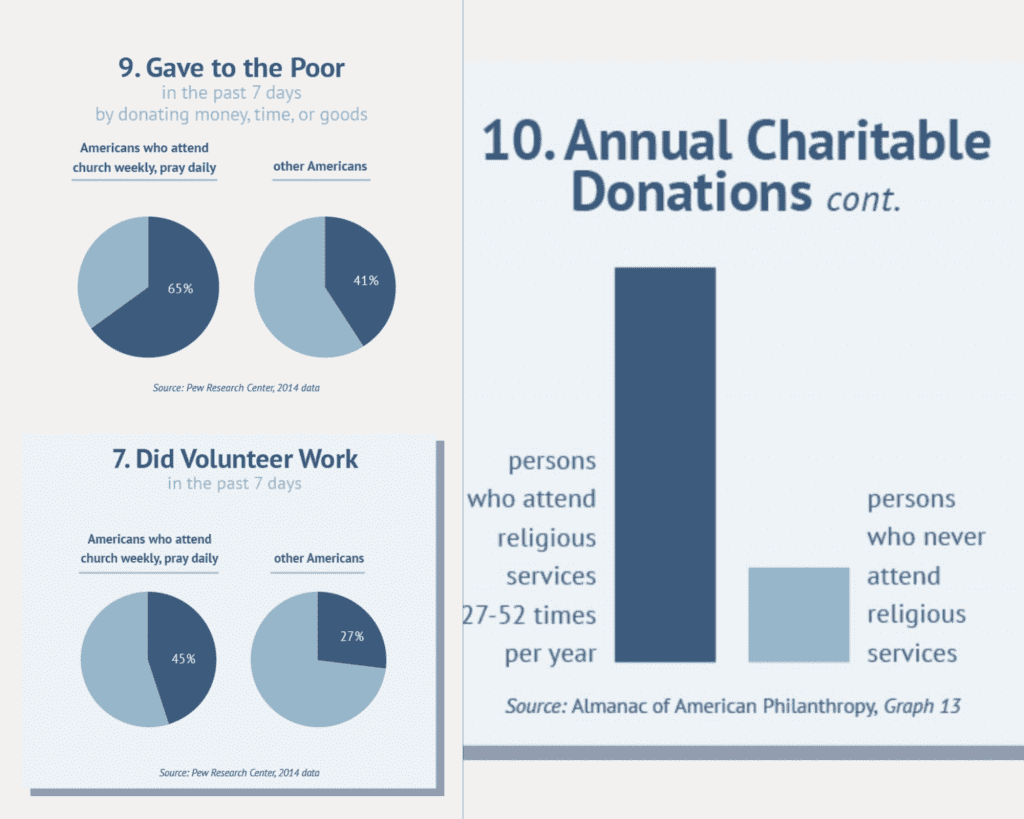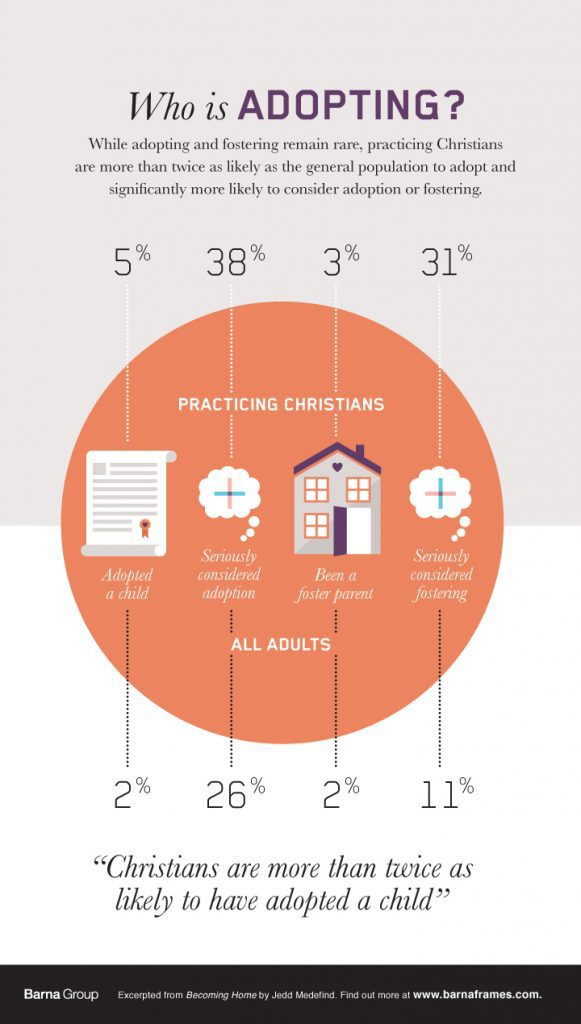To hear popular culture speak of the American Church, you’d think it was chock full of exclusively immoral grifters out for their own. And sure, you’ll find people like that in every institution. But the truth is that the local church (and really, all religious institutions like it) does more for communities, society, families, and mental and physical health than anything else in the world.
Sure, people can have faith and consider themselves religious without attending an actual church gathering on the regular. However, data shows that the church attendance is highly tied to the positive results that come from living a life of faith.
>>>> Learn more about my upcoming book: Reason to Return: Why Women Need the Church and the Church Needs Women
In the information below, I’ve captured a few “myths” about the church and then posted the opposing data. One needn’t be a Christian or religious themselves to appreciate the deep good that church brings to civil society and individuals.
This kind of new data surfaces regularly and that’s why it’s sad when we see church attendance on the decline. It means less generosity, volunteerism, civic participation and a breakdown of family and community. Everything includes nuance but years of research show how much the church plays a role in the most important aspects of our world. You can find a few pieces I’ve written about this subject here:
Take a look, save this post and remember what the data says when cultural narratives try to tear down the church.
What’s Really True About Christians in the Local Church?
Culture says: The Church is emotionally repressive and destructive to your mental health.
Data says: The only people who had improved mental health in 2020 were those who went to church weekly (online or in-person).
- Gallup poll on mental health in 2020.
- Gallup also found that 67% of weekly service attenders reported being “very satisfied” with their lives, whereas that was true for only 51% of the nation as a whole.
- Pew Research found that religious people tend to be happier and more civically engaged than non-believers or inactive church members.
Culture says: Church people don’t really care about the poor.
Data says: Churchgoers are some of the most generous people on the planet — in terms of both philanthropy, volunteerism and more.
- The USA Giving Foundation said that “giving and attendance at religious services have a high correlation.”
- A 2017 study from the Lilly Family School of Philanthropy found that 62 percent of religiously faithful families donate to charity, while only 46 percent of secular families do so.
- In their book, American Grace, Putnam and Campbell found that Putnam and Campbell confirmed in two unrelated surveys that of those who give to religious causes, 88% also give to secular causes like the American Cancer Society, humanitarian aid missions, etc.
- Catholic Charities is the largest social safety net for the vulnerable outside of the federal government.
- They also found that someone who attends church weekly is 81 percent likely to donate to secular causes, while someone who doesn’t is only 60 percent likely to donate to any cause at all.
- A 2011 Pew study on the civic and community engagement of religious Americans reported higher rates of volunteerism, giving, and civic participation among the faithful.
Culture says: Church is a waste of time.
Data says: Church increases your mental and physical health and increases your life expectency by 7 years.
- The Harvard School of Public Health found that people who attended weekly religious services or practiced daily prayer or meditation in their youth reported greater life satisfaction.
- Regular church attendance increases your life expectancy by 7 years, according to another report from the Harvard School of Public Health.
- From the Mayo Clinic: “Most studies have shown that religious involvement and spirituality are associated with better health outcomes, including greater longevity, coping skills, and health-related quality of life (even during terminal illness) and less anxiety, depression, and suicide. Several studies have shown that addressing the spiritual needs of the patient may enhance recovery from illness.”
- According to research from Michigan State University: Religion has a positive impact on a lower cancer risk or a better cancer prognosis and over 75% of the studies examining the effects of religion/on mortality found a positive effect on longevity.
Culture says: Church brings out the worst in people.
Data says: Religious people are less likely to commit crimes, drop out of school, abuse their wives or children and more likely to donate blood, volunteer, donate money and become civically involved.
- Rand found that communities with high religious rates correlate with lower crime.
- Baylor found that those who describe themselves as “religious” (as opposed to “spiritual but not religious”) are less likely to commit crimes.
- Research has found that religious people donate more blood.
- More religious communities have lower crime rates.
Culture says: Christians are just pro-birth, not pro-life.
Data says: Practicing Christians are much more likely to foster and adopt, as well as donate money toward pregnancy centers and other services for vulnerable moms.
- Barna Research found that practicing Christians are more than twice as likely to adopt.
- Pew Research found that 65 percent of non-kin foster parents attend religious services weekly – compared to 39 percent for the general population.
- Since 2010, giving to Christian adoption ministries has risen by 81% and to orphan care ministries by 90%.
- According to the Charlotte Lozier Institute, there are 3,000 pro-life pregnancy centers nationwide, funded through donations from Christians and providing guidance, counseling, physical needs and monetary support for moms and babies.
So what do we make of all this? Christians aren’t perfect (obviously), but there’s something about having an active faith — in all the ways that God intended — builds us and those around us up. It reminds us we’re living for something greater than ourselves. Even though plenty of Christians fail big time in the spotlight, it’s clear to see that God works through our imperfections and accomplishes His work through us despite them.
There’s work to be done, but there’s much to celebrate too. We must continue refining the Church in many ways, but there’s no doubt that some of the best of what God has for us here on Earth comes through the hands, and feet and hearts of those that serve Him within His house.
This post inspired by this Twitter thread from Josh Howerton.
If you want to stay in touch and learn more about church, Christian living, and developing a deeper faith, sign up for my email list here.




